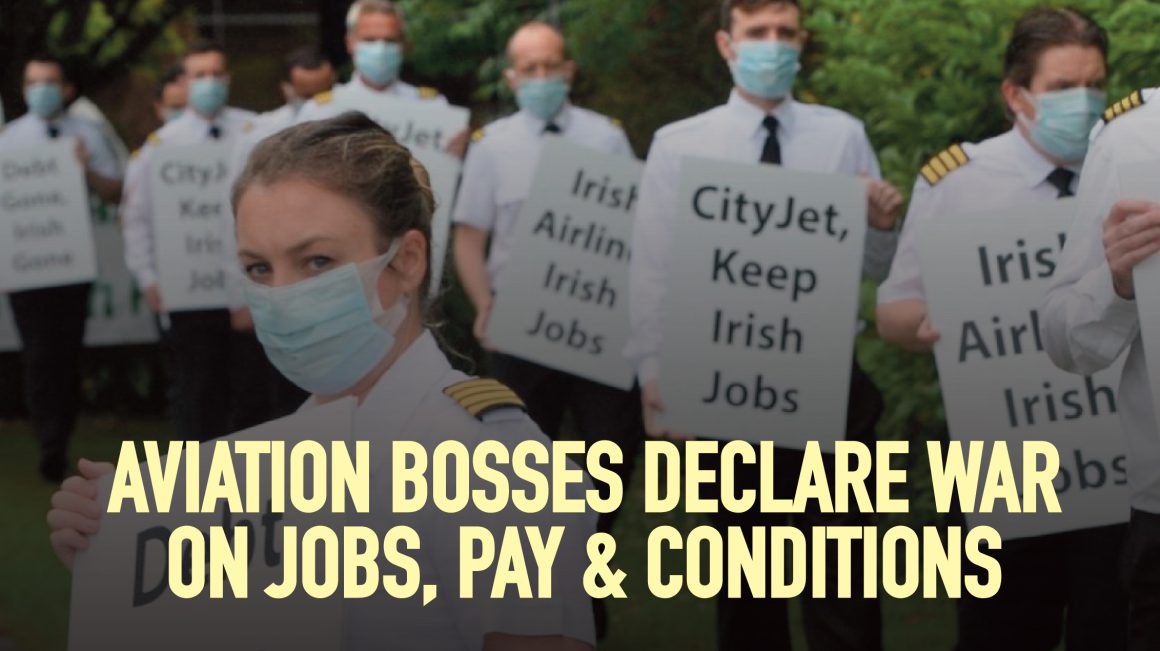By Ruth Coppinger & Chris Stewart
There is no denying that aviation internationally has been hit by the Covid crisis. In Ireland, North and South, airlines, airport authorities and the aircraft manufacturing and maintenance employers see this is as an opportunity to wage war on jobs, pay and working conditions.
Bombardier jobs
The announcement that 600 aerospace workers are set to lose their jobs at Bombardier’s Belfast site is a devastating blow to the region’s manufacturing sector. The announcement came just a week after Thompson Aero Seating announced 500 redundancies, following 430 layoffs of mostly agency workers by the company in March.
Bombardier says it will be making some 2,500 redundancies across its plants worldwide in response to falling demand due to the Coronavirus pandemic. Bombardier, a billion-dollar company, is more than capable of keeping on their workers. Many of these workers have given decades to the company, only to be thrown on the scrapheap when enough profits can’t be squeezed from their labour.
The aerospace sector alone accounts for some 10,000 jobs in Northern Ireland in direct and indirect employment.
Airlines attack their workers
In the South a brutal assault on the jobs, pay and conditions of workers is taking place at Aer Lingus, Ryanair and CityJet the latter seeking to offshore its entire workforce. The Dublin Airport Authority are looking for 1,000 redundancies and 20% pay cuts for remaining staff.
Aer Lingus workers had initially agreed a 50% cut, in recognition of the impact of the pandemic on aviation. However, management announced it would cut further to 30% of usual pay, along with mass layoffs.
On 9 June, a “secret” document of vicious pay cuts and drastic work changes was leaked to the media. Management said it would row back on aspects if unions accepted proposals within a week.
Disgracefully, the SIPTU leadership initially complied with this gun-to-the-head deadline, saying a ballot couldn’t be carried out as things were so urgent. To the credit of the cabin crew, Fórsa insisted on a ballot and workers decisively rejected management proposals after which SIPTU belatedly announce they will ballot its members after all!
The duration of the cuts package is meant to be until the end of February 2022, but the preamble mentions changes will “last in perpetuity” and are “irrevocable”. Long-standing Aer Lingus workers say cuts they accepted over 10 years ago in the last crisis were never restored.
These cuts are unjustifiable — Aer Lingus has been making profits now for a decade and has cash reserves of almost €900 million to get it through what is clearly a crisis, but a temporary one. In 2018-19, the company made profits of €305m and €276m respectively.
Put workers before profits!
International Airlines Group owns a huge range of airlines, from British Airways to Iberia to Aer Lingus and more. It has revenue of €25 billion. The idea that the aviation industry, including Aer Lingus, can’t weather this storm without pauperising its workforce is ludicrous.
Similarly, with Ryanair who are pushing to shed thousands of jobs. Since 2008 Ryanair has paid out to shareholders €6.8 billion in the form of dividends and share buy backs.
In response to the crisis some governments have been forced to intervene to protect their aerospace and manufacturing industries. The French government has announced a €15 billion intervention to support Airbus and Air France. In Germany the government has supported Lufthansa to the tune of €8 billion and taken a 20% equity share in the company which used to be wholly publicly owned.
Aer Lingus never should have been sold off to vulture capitalists. As an island nation, public control of an airline and connectivity is especially important. It should be re-nationalised now to save jobs but so that workers and the state can benefit from the profits when the crisis is over. Likewise with all the other companies in the sector North and South threatening jobs. With climate change, public control of aviation is also vital to implement the type of change needed, while guaranteeing a just transition for workers.












